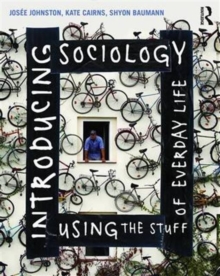Description
| Product ID: | 9781138023383 |
| Product Form: | Paperback / softback |
| Country of Manufacture: | GB |
| Title: | Introducing Sociology Using the Stuff of Everyday Life |
| Authors: | Author: Josee Johnston, Shyon Baumann, Kate Cairns |
| Page Count: | 476 |
| Subjects: | Sociology, Sociology |
| Description: | Select Guide Rating The goal of this book is for students to develop a sociological imagination, or perspective, that allows them to think broadly about the problems and issues in their individual lives, and move beyond the limitations of myopic individualism. By starting with consumer culture, and the "stuff" it so voluminously produces, this book will encourage students to unpack the back-story behind the stuff they love (and the stuff they hate). Through this process, they will see that the seemingly individual act of shopping – whether that be selecting a tube of toothpaste, or ordering a pair of shoes online – is never a solo experience. Instead, it is a profoundly collective phenomenon that joins the cultural and the material world, individual agents with broader structures, and local realities with global trends. The challenges of teaching a successful introductory sociology course today demand materials from a publisher very different from the norm. Texts that are organized the way the discipline structures itself intellectually no longer connect with the majority of student learners. This is not an issue of pandering to students or otherwise seeking the lowest common denominator. On the contrary, it is a question of again making the practice of sociological thinking meaningful, rigorous, and relevant to today’s world of undergraduates. This comparatively concise, highly visual, and affordable book offers a refreshingly new way forward to reach students, using one of the most powerful tools in a sociologist’s teaching arsenal—the familiar stuff in students’ everyday lives throughout the world: the jeans they wear to class, the coffee they drink each morning, or the phones their professors tell them to put away during lectures. A focus on consumer culture, seeing the strange in the familiar, is not only interesting for students; it is also (the authors suggest) pedagogically superior to more traditional approaches. By engaging students through their stuff, this book moves beyond teaching about sociology to helping instructors teach the practice of sociological thinking. It moves beyond describing what sociology is, so that students can practice what sociological thinking can do. This pedagogy also posits a relationship between teacher and learner that is bi-directional. Many students feel a sense of authority in various areas of consumer culture, and they often enjoy sharing their knowledge with fellow students and with their instructor. Opening up the sociology classroom to discussion of these topics validates students’ expertise on their own life-worlds. Teachers, in turn, gain insight from the goods, services, and cultural expectations that shape students’ lives. While innovative, the book has been carefully crafted to make it as useful and flexible as possible for instructors aiming to build core sociological foundations in a single semester. A map on pages ii–iii identifies core sociological concepts covered so that a traditional syllabus as well as individual lectures can easily be maintained. Theory, method, and active learning exercises in every chapter constantly encourage the sociological imagination as well as the "doing" of sociology. |
| Imprint Name: | Routledge |
| Publisher Name: | Taylor & Francis Ltd |
| Country of Publication: | GB |
| Publishing Date: | 2016-12-22 |


